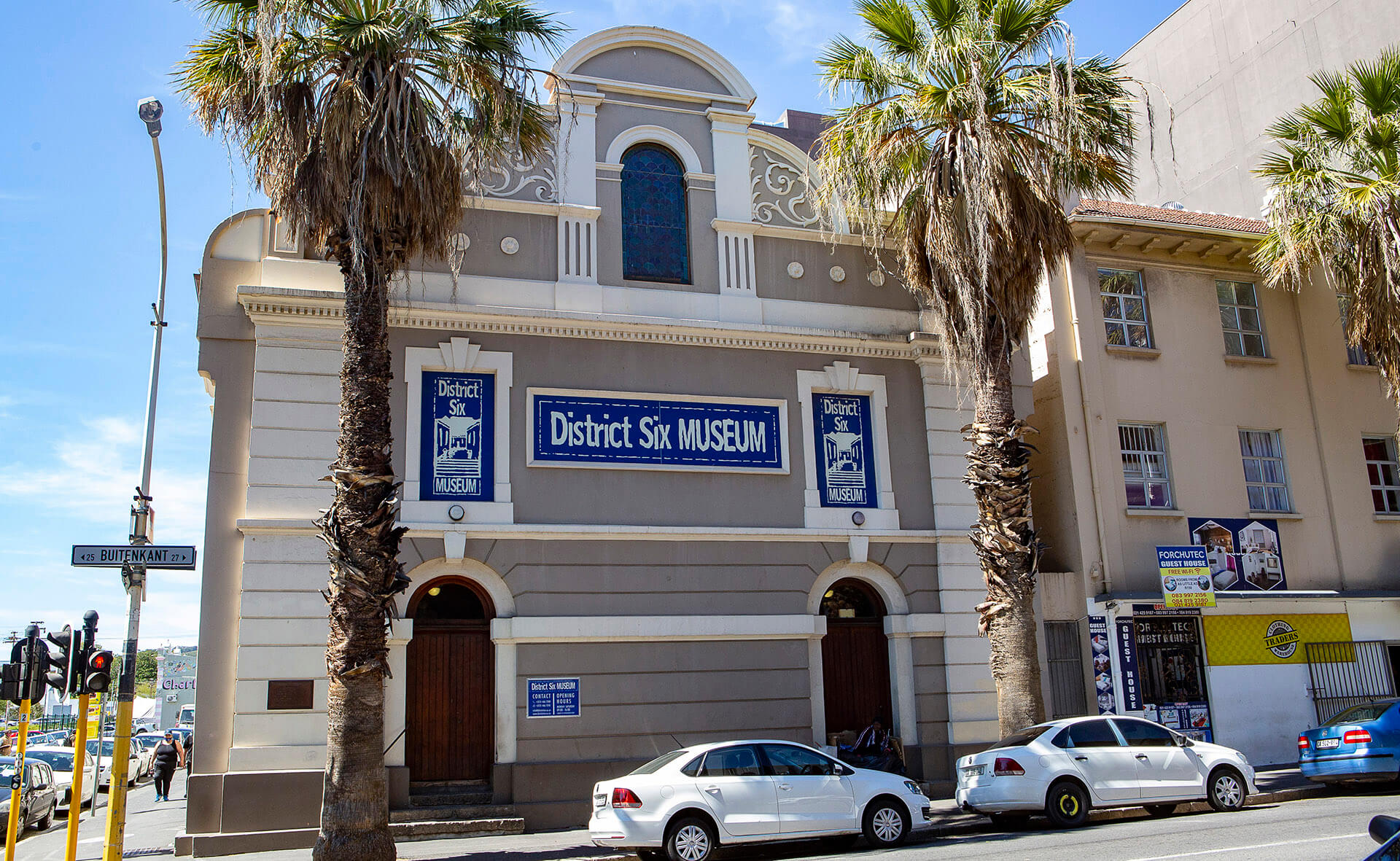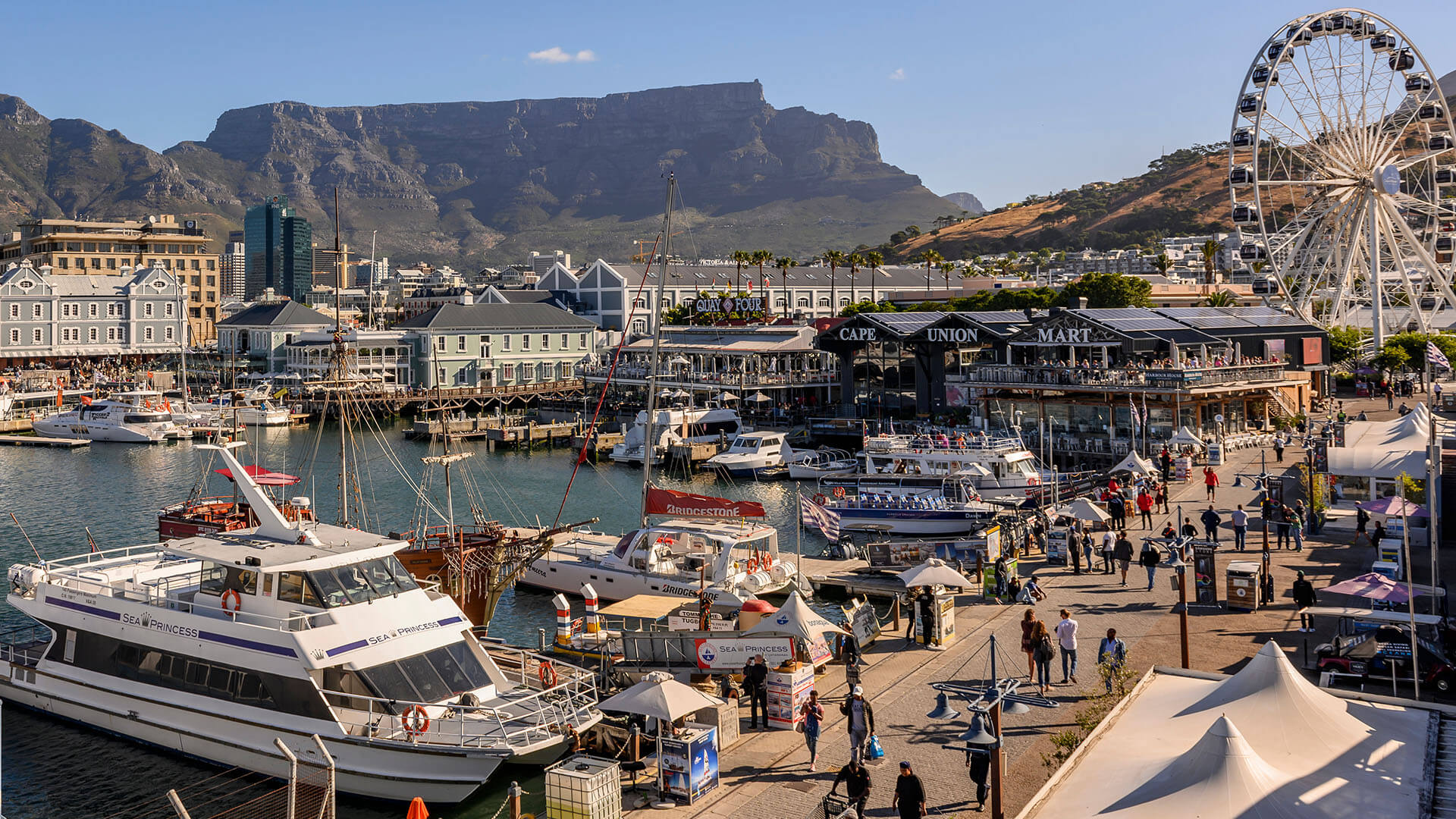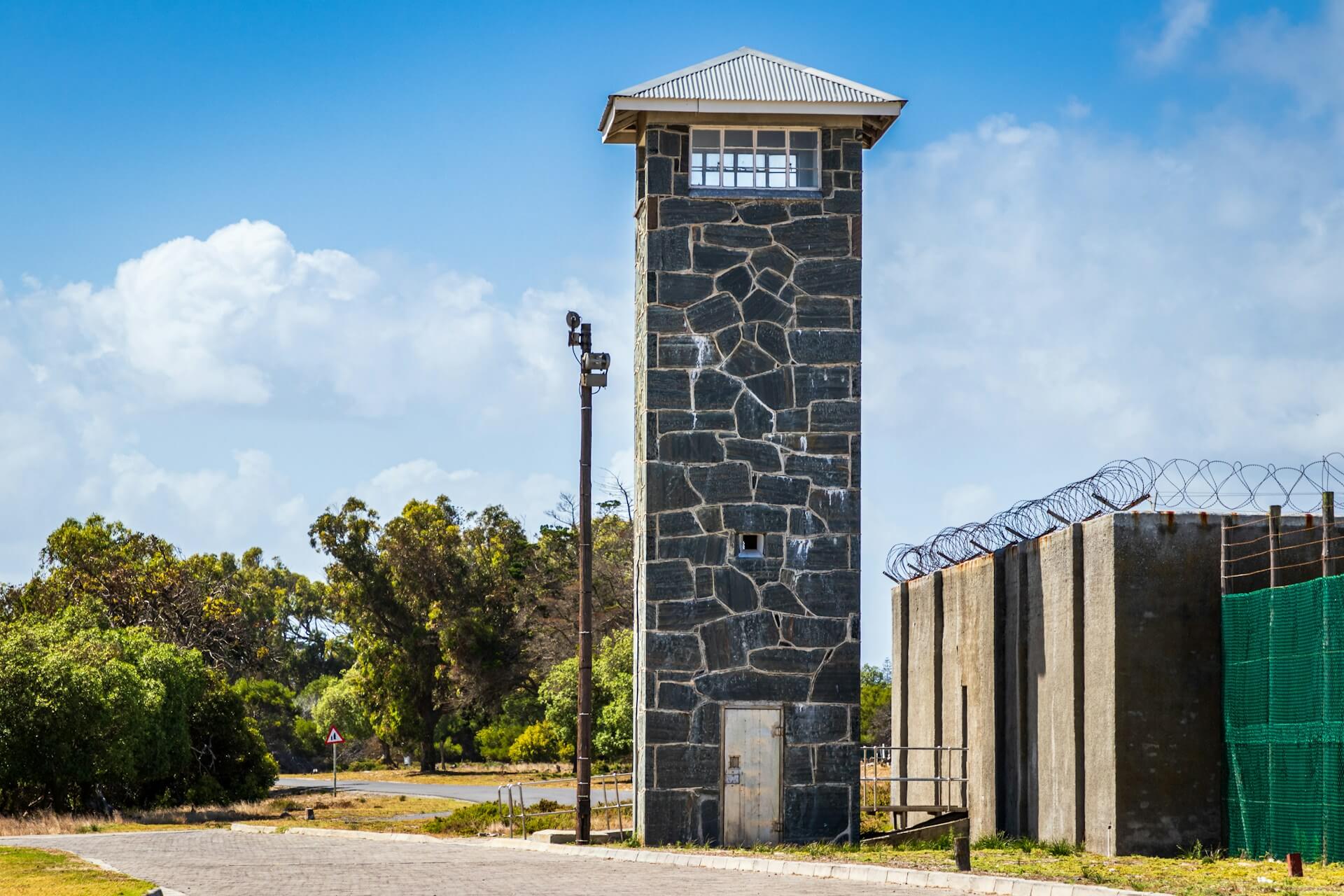5. Top Attractions
District Six Museum & Other Cultural Museums in Cape Town

Cape Town isn’t just a city of breathtaking mountains and beaches—it’s also a place of deep history and cultural resilience. To truly understand the Mother City, visitors must go beyond the postcard views and explore its stories of struggle, creativity, and identity.
At the heart of this journey is the District Six Museum, a moving memorial to one of apartheid’s most tragic legacies. But Cape Town is also home to several other cultural museums, each preserving a different aspect of the city’s heritage. Together, they paint a picture of Cape Town’s past, present, and future.
1. District Six Museum: Remembering Forced Removals
The Story of District Six
- District Six was once a vibrant, multicultural community of over 60,000 people.
- In the 1960s, the apartheid government declared it a “whites-only” area, forcibly removing residents and bulldozing homes.
- Families were relocated to distant townships on the Cape Flats, losing not only their homes but also their livelihoods and sense of community.
The Museum Experience
- Opened in 1994, the District Six Museum serves as a place of memory and healing.
- Exhibits include:
- Street Maps where former residents have handwritten the names of their families and neighbors.
- Personal Stories told through photographs, oral histories, and artifacts.
- Everyday Objects—from furniture to clothing—symbolizing the lives disrupted.
Why It’s Powerful
- Many tours are guided by former residents, who share their firsthand experiences.
- The museum emphasizes not just loss, but resilience, showing how displaced communities rebuilt their lives.
👉 Visiting the District Six Museum is an emotional and essential experience for anyone wanting to understand Cape Town’s layered history.
2. Other Cultural Museums in Cape Town
Iziko Slave Lodge
- One of the oldest buildings in Cape Town, dating back to 1679.
- Once housed enslaved people brought from Africa and Asia by Dutch colonists.
- Today, it’s a museum exploring slavery, human rights, and the struggle for freedom.
Iziko South African Museum
- Founded in 1825, it’s the country’s oldest museum.
- Exhibits cover natural history, fossils, rock art, and cultural artifacts.
- Great for families and those interested in anthropology and archaeology.
Iziko South African National Gallery
- Cape Town’s premier art gallery.
- Showcases South African, African, and international art, from historical works to contemporary exhibitions.
- A must for art lovers exploring the Company’s Garden area.
Castle of Good Hope
- The oldest surviving colonial building in South Africa, built by the Dutch East India Company in the 17th century.
- Houses military exhibits and explores the history of Cape Town’s colonization.
Robben Island Museum (via V&A Waterfront)
- Technically offshore, but part of Cape Town’s cultural landscape.
- Former prison where Nelson Mandela and other political leaders were held.
- Tours are led by former prisoners, offering a powerful perspective.
Heart of Cape Town Museum
- Located at Groote Schuur Hospital.
- Commemorates the world’s first successful human heart transplant performed by Dr. Christiaan Barnard in 1967.
- Highlights Cape Town’s role in global medical history.
3. Practical Visitor Information
District Six Museum
- Location: 25A Buitenkant Street, Cape Town City Centre.
- Entrance Fee: Around R60 for self-guided, R80–R100 with a guided tour.
- Opening Hours: Monday–Saturday, 9 AM – 4 PM (closed Sundays).
- Best Way to Visit: Combine with a city walking tour or local guide for deeper context.
Tips for Exploring Cultural Museums in Cape Town
- Plan Half a Day: District Six Museum requires time for reflection.
- Book Guided Tours: Hearing personal stories adds depth to the experience.
- Combine Visits: Many museums are within walking distance in the City Bowl and Company’s Garden.
- Respect the Spaces: These are living memorials—photograph respectfully.
4. Why Cultural Museums Matter
Visiting Cape Town’s cultural museums provides:
- Context: Understanding South Africa’s apartheid history and colonial past.
- Connection: Meeting guides and hearing personal stories brings history to life.
- Perspective: Recognizing resilience and creativity in the face of oppression.
- Balance: A counterpoint to Cape Town’s natural attractions, offering deeper meaning to your visit.
Final Thoughts
The District Six Museum and Cape Town’s other cultural museums are not just stops on a tourist map—they are spaces of memory, healing, and education. By exploring them, visitors gain a deeper understanding of South Africa’s history, its struggles, and its triumphs.
For anyone who wants to truly connect with Cape Town, these museums are essential experiences that enrich your journey far beyond the surface beauty of the city.

5. Top Attractions
Table Mountain: Cable Car & Hiking Trails – The Ultimate Guide

No trip to Cape Town is complete without visiting Table Mountain, the city’s most iconic landmark and one of the New 7 Wonders of Nature. Rising 1,085 meters above sea level, this flat-topped mountain dominates the skyline and rewards visitors with breathtaking views of Cape Town, Table Bay, Robben Island, the Atlantic Ocean, and even the Cape Peninsula on clear days.
Whether you take the rotating cable car or challenge yourself with one of the scenic hiking trails, visiting Table Mountain is an unforgettable adventure that combines nature, history, and stunning panoramas.
1. Table Mountain Cable Car Experience
The Table Mountain Aerial Cableway is the fastest and easiest way to reach the summit. Since 1929, it has carried over 30 million passengers to the top.
How It Works
- Rotating Floor: The cable car rotates 360° during the 5-minute ascent, giving everyone panoramic views.
- Capacity: Each car carries up to 65 passengers.
- Duration: Around 4–5 minutes to reach the summit.
Operating Hours
- Runs daily, weather permitting.
- First car: typically 8:30 AM.
- Last car down: depends on season (check official schedule).
Ticket Prices (2025 estimates)
- Adults: R420 return / R240 one-way.
- Children (4–17 years): R210 return / R120 one-way.
- Discounts available for online bookings and locals on certain days.
Tips for Riding the Cable Car
- Buy Tickets Online: Skip the long queues, especially in summer.
- Check Weather: Strong winds or heavy clouds (the famous “tablecloth”) can halt operations.
- Go Early or Late: Sunrise and sunset rides are less crowded and more magical.
- Bring a Jacket: Even in summer, it can be chilly at the summit.
2. Hiking Table Mountain: Trails for Every Level
For adventurers, hiking up Table Mountain is a bucket-list experience. The mountain offers over 350 routes, from straightforward walks to challenging scrambles.
Popular Hiking Routes
a) Platteklip Gorge
- Duration: 2–3 hours (one way).
- Difficulty: Moderate but steep.
- Features: Direct route up the mountain, well-marked steps, and switchbacks.
- Best For: First-time hikers and those short on time.
b) Skeleton Gorge
- Duration: 4–6 hours.
- Difficulty: Challenging.
- Features: Starts in Kirstenbosch Botanical Gardens, climbs through lush forests, includes ladders and rock scrambles.
- Best For: Experienced hikers and nature lovers.
c) India Venster
- Duration: 3–4 hours.
- Difficulty: Strenuous.
- Features: Steep trail with sections requiring scrambling. Stunning views of the city and Lion’s Head.
- Best For: Adventurous hikers with good fitness.
d) Kasteelspoort
- Duration: 4–5 hours.
- Difficulty: Moderate.
- Features: Scenic route from Camps Bay, passes the famous “Diving Board” rock.
- Best For: Photographers and those seeking less crowded trails.
Hiking Safety Tips
- Hike in groups—never alone.
- Start early to avoid the midday heat.
- Carry water, snacks, sunscreen, and a map or GPS.
- Always check weather forecasts before heading out.
- If unsure, hire a professional guide.
3. What to Expect at the Summit
The Table Mountain plateau stretches nearly 3 km across and offers plenty to explore.
- Views: 360° panoramas of Cape Town, Robben Island, Devil’s Peak, Lion’s Head, and the Cape Peninsula.
- Café & Shop: Grab a coffee or light meal at the top.
- Walkways: Well-marked paths for exploring different viewpoints.
- Wildlife & Flora: Look out for dassies (rock hyraxes) and unique fynbos plants found only in the Cape Floral Kingdom.
4. When to Visit Table Mountain
Best Times of Year
- Summer (Nov–Feb): Warm, clear skies but busiest season.
- Autumn (Mar–May): Fewer crowds, cooler hiking conditions.
- Winter (Jun–Aug): Rainy and cloudy, but beautiful on clear days.
- Spring (Sep–Oct): Blooming flowers and mild temperatures.
Best Times of Day
- Morning: Clearer skies and smaller crowds.
- Sunset: Magical golden views over the Atlantic Ocean.
- Night Tours: Special evening rides are sometimes offered.
5. Practical Tips for Visitors
- Footwear: Comfortable shoes even if taking the cable car.
- Weather: Cape Town weather changes quickly—layers are essential.
- Photography: Bring extra memory cards and batteries—the views are endless.
- Accessibility: The cable car and summit walkways are wheelchair-friendly.
6. Fun Facts About Table Mountain
- Oldest Mountain: Estimated at over 260 million years old.
- World Heritage Site: Part of the Cape Floral Region, home to over 2,000 plant species.
- Celebrity Status: Nelson Mandela described Table Mountain as a “gift to the Earth.”
- New 7 Wonders: Officially named one of the New 7 Wonders of Nature in 2011.
Final Thoughts
Table Mountain is more than just Cape Town’s backdrop—it’s the city’s soul and crown jewel. Whether you ride the rotating cable car or tackle one of the scenic hiking trails, reaching the summit is an unforgettable experience filled with panoramic views, fresh mountain air, and a sense of achievement.
For first-time visitors, the cable car offers ease and accessibility, while adventurers will love the challenge of hiking routes like Platteklip Gorge or Skeleton Gorge. Whichever way you choose, Table Mountain will leave you in awe—a memory etched forever in your South African journey.
5. Top Attractions
V&A Waterfront: Shopping, Dining & Entertainment in Cape Town

If Cape Town is the Mother City, then the Victoria & Alfred (V&A) Waterfront is its beating heart. Set against the backdrop of Table Mountain and the bustling harbor, the V&A Waterfront is South Africa’s most visited destination, attracting more than 24 million visitors every year.
This vibrant hub blends world-class shopping, fine dining, live entertainment, museums, luxury hotels, and family attractions—all while retaining its charm as a working harbor. Whether you’re here to shop for designer labels, enjoy a sunset cruise, or catch a ferry to Robben Island, the V&A Waterfront has something for everyone.
1. Shopping at the V&A Waterfront
The V&A Waterfront is a shopper’s paradise, with over 450 retail outlets ranging from international brands to local designers.
The Shopping Experience
- Victoria Wharf Shopping Centre: The main mall, home to fashion, lifestyle, and electronics stores.
- Luxury Labels: Gucci, Louis Vuitton, and other designer brands for high-end shoppers.
- Local Artisans: South African jewelry, fashion, and crafts at smaller boutiques.
- Watershed Market: A creative space featuring over 150 local designers selling crafts, textiles, jewelry, and décor. Perfect for souvenirs.
👉 Tip: Visit the Watershed if you’re looking for authentic South African products that support local artists.
2. Dining at the V&A Waterfront
From fine dining with harbor views to casual cafés, the V&A Waterfront is a food lover’s dream.
Restaurants & Cafés
- Harborfront Dining: Fresh seafood at restaurants like Baia Seafood or Harbour House.
- International Cuisine: Italian, Asian, and fusion eateries cater to all tastes.
- South African Favorites: Karibu and Gold Restaurant offer local dishes like bobotie, bunny chow, and Cape Malay curries.
- Casual Eats: Burger joints, bakeries, and ice cream parlors for families on the go.
Food Markets
- V&A Food Market: Street food, craft beer, and artisanal bites in a vibrant setting.
- Makers Landing: A food incubator showcasing Cape Town’s diverse culinary heritage.
👉 Tip: Try a seafood platter paired with a South African wine while watching the sunset over Table Mountain.
3. Entertainment & Attractions
The V&A Waterfront isn’t just about shopping and dining—it’s packed with attractions for all ages.
Museums & Culture
- Zeitz Museum of Contemporary Art Africa (MOCAA): Africa’s largest contemporary art museum, housed in a converted grain silo.
- Two Oceans Aquarium: A must-visit for families, featuring marine life from the Atlantic and Indian Oceans.
- Chavonnes Battery Museum: A historic fort with exhibits on Cape Town’s colonial past.
Cruises & Activities
- Sunset Cruises: Sail into the Atlantic and watch the sun dip behind Table Mountain.
- Boat Tours: Short harbor cruises for families or luxury yacht experiences for couples.
- Robben Island Ferries: Depart daily from Nelson Mandela Gateway at the V&A Waterfront.
Live Entertainment
- Amphitheatre: Free outdoor concerts, dance shows, and performances.
- Street Performers: Local musicians and dancers add to the vibrant atmosphere.
4. Family-Friendly Fun
- Scratch Patch: Kids can dig for semi-precious stones like amethyst and tiger’s eye.
- Playgrounds & Kids’ Zones: Safe spaces for younger children to play.
- Cinemas: Watch the latest movies at the Nu Metro complex.
👉 The V&A Waterfront is perfect for families, offering educational attractions, kid-friendly dining, and activities for all ages.
5. Luxury Stays at the V&A Waterfront
For those who want to stay right in the action, the V&A Waterfront offers some of Cape Town’s most luxurious hotels:
- One&Only Cape Town – Ultra-luxury resort with mountain views and a private spa island.
- Cape Grace Hotel – Classic elegance on a private quay.
- The Table Bay Hotel – Known for its stunning views and prime location.
6. Events & Festivals
The V&A Waterfront hosts year-round events, from summer music festivals to holiday markets. Seasonal highlights include:
- Christmas Markets: Lights, decorations, and festive shopping.
- Wine & Food Festivals: Celebrating South Africa’s culinary heritage.
- Cultural Celebrations: Showcasing local dance, art, and music.
7. Why the V&A Waterfront is a Must-Visit
- Convenience: Easily accessible from anywhere in Cape Town.
- Variety: A one-stop destination for shopping, dining, culture, and entertainment.
- Views: Panoramic backdrops of Table Mountain and the Atlantic Ocean.
- Gateway to Robben Island: Historical tours start right here.
Final Thoughts
The V&A Waterfront is more than just a shopping center—it’s a cultural and entertainment hub that captures the spirit of Cape Town. Whether you’re here for a quick shopping spree, a family day out at the aquarium, a romantic sunset cruise, or a deep dive into South African art and history, the V&A Waterfront offers an experience you won’t forget.
It’s the perfect place to start or end your Cape Town journey, blending modern attractions, historic charm, and stunning scenery into one vibrant destination.
5. Top Attractions
Robben Island: History & Tours – A Journey Through South Africa’s Past

Few places in the world carry as much historical weight and cultural significance as Robben Island. Located just 7 km off the coast of Cape Town, this small island has witnessed centuries of change—from a leper colony and military base to its most infamous role as a maximum-security prison during apartheid.
Today, Robben Island is a UNESCO World Heritage Site and one of South Africa’s most visited attractions. A tour here is more than sightseeing—it’s a powerful and moving experience that sheds light on the country’s struggle for freedom and democracy.
1. The History of Robben Island
Early Years
- The island was first used in the 17th century by Dutch settlers as a penal colony.
- Its isolation made it a natural place of banishment for political and social outcasts.
A Place of Suffering
- Over the centuries, it served as a leper colony, a mental institution, and a military base during World War II.
The Apartheid Era
- From the 1960s to 1991, Robben Island became synonymous with apartheid-era imprisonment.
- Nelson Mandela spent 18 of his 27 years in prison here, alongside other political leaders like Walter Sisulu and Govan Mbeki.
- Prisoners endured harsh conditions but also used the time to educate one another, calling it the “University of Robben Island.”
Legacy
- In 1999, Robben Island was declared a UNESCO World Heritage Site as a symbol of human resilience and the triumph of freedom over oppression.
2. The Robben Island Tour
Visiting Robben Island is both a historical journey and a cultural experience. Tours are designed to give visitors a first-hand understanding of its significance.
The Experience
- Ferry Ride: Tours begin at the Nelson Mandela Gateway at the V&A Waterfront. The ferry ride takes about 30–40 minutes across Table Bay.
- Guided Bus Tour: On arrival, visitors board buses for a tour around the island, visiting key sites such as the leper cemetery, lime quarry, and old army bunkers.
- Prison Tour: Former political prisoners often lead this part of the tour, sharing personal stories that bring history to life.
- Mandela’s Cell: The highlight is a visit to Cell Number 7, Nelson Mandela’s small cell where he spent nearly two decades.
Duration
- Entire tour lasts about 3.5–4 hours, including ferry travel.
3. Practical Information for Visitors
Tickets
- Adults: Around R600–R650 (2025 estimate).
- Children: Reduced rates available.
- Tickets can be booked online via the official Robben Island Museum website or at the V&A Waterfront.
Operating Hours
- Tours usually run 3 times daily (morning, midday, afternoon).
- Always confirm schedules in advance as trips are weather dependent.
Accessibility
- The ferries and tours are generally wheelchair accessible.
- Visitors with mobility issues should check in advance for assistance.
Tips for Your Visit
- Book Early: Tickets often sell out days in advance, especially in peak season (Dec–Feb).
- Check Weather: High winds or rough seas may cause cancellations.
- Bring Essentials: Sunscreen, hat, water, and a light jacket for the ferry.
- Be Prepared Emotionally: The stories and atmosphere can be deeply moving.
4. Why Robben Island is a Must-Visit
Historical Significance
- Visiting Robben Island offers a chance to understand South Africa’s painful past and the sacrifices made for democracy.
Cultural Impact
- Hearing stories directly from former prisoners creates a powerful connection to history that no textbook can provide.
Panoramic Views
- The ferry ride offers incredible views of Table Mountain and Cape Town’s coastline—some of the best photo opportunities in the city.
Symbol of Freedom
- Robben Island stands as a reminder of resilience, reconciliation, and the importance of protecting human rights.
5. Alternatives & Complementary Experiences
- District Six Museum: Learn about forced removals during apartheid.
- Apartheid Museum (Johannesburg): For those traveling further in South Africa.
- V&A Waterfront Exhibits: Visit the Nelson Mandela Gateway museum before your ferry trip.
Final Thoughts
A trip to Robben Island is not just another tourist activity—it’s a journey into South Africa’s soul. The stories of hardship, resilience, and ultimate triumph will leave a lasting impression on every visitor.
Whether you’re a history buff, a student of human rights, or simply a curious traveler, Robben Island provides an experience that is educational, emotional, and unforgettable. It’s a must-visit for anyone coming to Cape Town.
-

 5. Top Attractions6 months ago
5. Top Attractions6 months agoCape Point & Cape of Good Hope: A Complete Guide
-

 5. Top Attractions6 months ago
5. Top Attractions6 months agoBoulders Beach & The African Penguin Colony: A Cape Town Must-See
-

 1. Introduction5 months ago
1. Introduction5 months agoQuick Facts About Cape Town: Everything You Need to Know Before You Go
-

 3. Getting There & Around5 months ago
3. Getting There & Around5 months agoRenting a Car vs. Using Rideshare Apps in Cape Town
-

 3. Getting There & Around5 months ago
3. Getting There & Around5 months agoPublic Transport in Cape Town: MyCiTi Bus, Trains & Taxis
-

 3. Getting There & Around5 months ago
3. Getting There & Around5 months agoAirport Transfers & Transportation Options in Cape Town
-

 2. Planning Your Trip5 months ago
2. Planning Your Trip5 months agoVisa Requirements & Entry Guide for Cape Town, South Africa
-

 2. Planning Your Trip5 months ago
2. Planning Your Trip5 months agoCape Town Airport Arrival Guide: What to Expect When You Land in South Africa


















